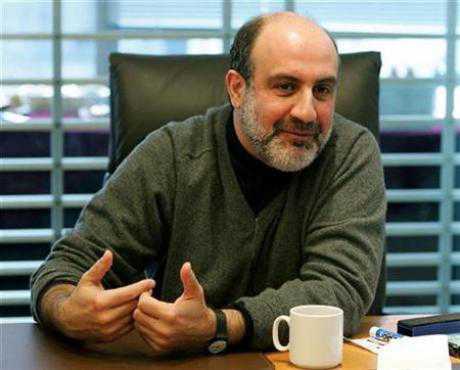
By Adam Cox
STOCKHOLM (Reuters) – Did the Nobel prize help trigger the worst financial crisis since the Great Depression?
Nassim Taleb, who shot to fame with his ideas about risk in the book “The Black Swan,” believes the economics award and the theories it celebrates deserve their share of blame.
“I want to remove the harm from these economic models. And the Nobel is not helping. They should be held partly responsible, if not largely responsible, for the crisis,” Taleb told Reuters by telephone.
The first of the Nobel awards will be announced next Monday, with the economics prize due a week later on Oct 11.
According to Taleb, there are a number of mistaken ideas about forecasting and measuring risk, which all contribute to events like the 2008 global crisis. The Nobel prize, he says, has given them a stamp of approval, allowing them to propagate.
Taleb is a former trader who took advantage of the mispricing of derivatives to make his fortune in the years before the crisis. He published “The Black Swan” in 2007 and went on to make millions more during the upheaval.
He rattles off a list of Nobel prize winners who make his blood boil. They include: Harry Markowitz, William Sharpe, Robert Merton, Myron Scholes, Robert Engle, Franco Modigliani and Merton Miller — a virtual “Who’s Who” of the economic world.
Merton and Scholes, for instance, were recognized for their work in valuing derivatives. Modigliani and Miller are known for a theory which some have argued promotes financing by debt.
Taleb attacks their works for how they are constructed and what they lead to. “There is no world in which these ideas can work mathematically,” he said.
Forecasting methods, which he discusses in detail in his book, create a false sense of security or, worse, send people in the wrong direction. Universities then compound the problem by teaching these Nobel-approved ideas as orthodoxy.
His conversation is peppered with metaphors. “If I give you a map of Sparta when you’re in Johannesburg, you will definitely have a problem,” he says of the tools used in modern finance.
Taleb said he has met with the King of Sweden and suggested he do something about the economics prize, which was an addition in the 1960s to the roster of prizes awarded since 1901 for science, literature and peace.
“HE CRASHED THE PLANE”
But if he is unable to make headway in Stockholm, does Taleb believe his new influence can help him change the practices of important policy makers? He will be the first to say that his blunt, uncompromising manner make that highly unlikely.
He says he walked out of a meeting that included Treasury Secretary Timothy Geithner and other luminaries and wouldn’t feel comfortable shaking their hands.
Federal Reserve Governor Ben Bernanke he calls “a true charlatan,” arguing his idea of a “Great Moderation” made the world more dangerous because it masked underlying risks.
“He got us here. He crashed the plane,” Taleb said. “I say it literally, he doesn’t know what’s going on.”
In Europe, Taleb’s ideas have found more favor. He spent time with British Prime Minister David Cameron and said the new leader’s policies are visibly influenced by “The Black Swan.”
Asked if he would accept a Nobel prize himself if selected, Taleb is uncharacteristically hesitant. People might think he had sold out, he worries. But he concludes: “If it would help society that I got something like that, I probably would.”
For now, Taleb is content to write books and try to advance his ideas. He says he has given up trading, but has a clear purpose for all the profits he made. “I’m using the money now to finance the destruction of the economic establishment.”
, Sep 28, 2010
